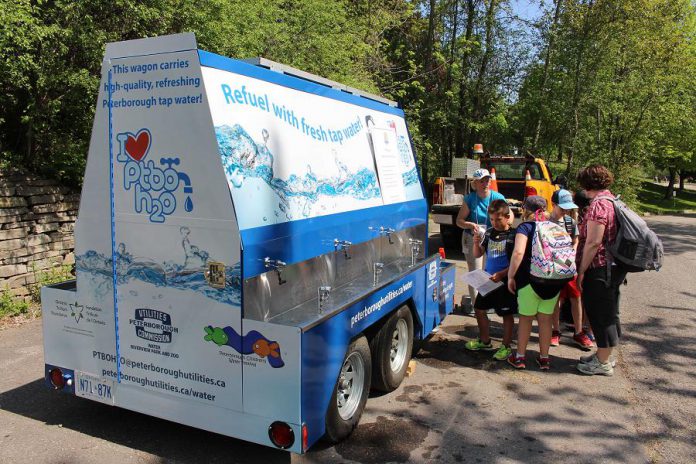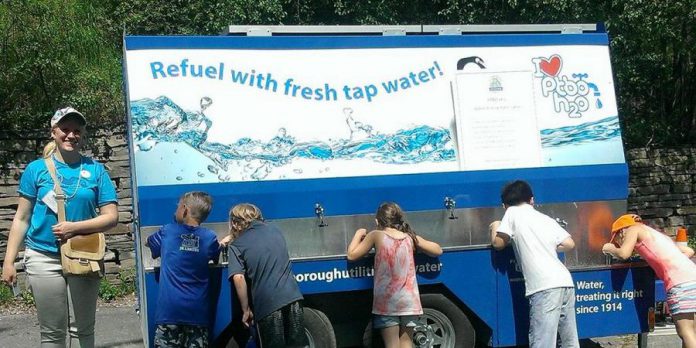
Why are people still buying bottled water?
I asked myself this question during a recent trip to the grocery store. Several shoppers were piling multiple cases of individually packed plastic bottles of water into their carts while a nearby sign advertised the everyday low price of only $1.88. Why are they spending money on bottled water when many have a safe water source, right from the nearby tap?
Is bottled water cheaper?
At fewer than two dollars per case, it might seem cheaper, but it is quite the opposite. According to the Council of Canadians, bottled water is 2,000 times more energy intensive to produce than tap water. And Canadians spend a lot of money on bottled water generating $2.5 billion in annual sales for the bottled water industry, which is led by big brands like Nestle, Perrier, and Montclair.
Do people think it is safer to drink?
Regardless of the type of water you purchase (spring, well, mineral, or distilled), once water is packaged up in a bottle it is considered a food product and it is therefore regulated by the Federal Food and Drugs Act.
However, your tap water has much more stringent regulations than bottled water, with the Canadian Drinking Water Quality Guidelines setting out very thorough quality measures to ensure its safety.
Locally, the Peterborough Utilities Commission (PUC) manages our water to meet and exceed government requirements for water testing. The PUC conducts more than 20,000 tests a year, which equates to a test every half hour. This ensures that our drinking water is of the highest quality. Tap water is safer and more reliable to drink with higher quality standards than bottled water.
Is clean, safe water inaccessible for most people?
We are very fortunate here in Peterborough but, unfortunately not everyone has clean, safe, healthy water coming from their taps. The David Suzuki Foundation reports that in Canada, there are more than 1,000 boil-water advisories in place on any given day.
In this region, residents who rely on water from the Otonabee River have recently experienced boil-water advisories, and Curve Lake has been on a boil-water advisory for years. All the more reason to not take our local tap water for granted.
Does bottled water taste better?
I have heard some Peterborians complain of an earthy taste in our tap water. I too have noticed it in the summer months.
In Peterborough, our water comes from the Otonabee River and during the warmer months of the year, there is an alga that grows in the river. It produces a compound that can be detected in the taste of the water, even after treatment.
I’ve become quite accustomed to this seasonal taste in our water, but if you don’t like it, try filling a jug and placing it in your fridge; when the water is chilled, the earthy taste is lessened.
Activated carbon filter systems can also be used to remove tastes from tap water. There are many pros and cons to using home filtration systems including ongoing maintenance, space requirements, and cost of technology. The Health Canada website at www.hc-sc.gc.ca covers many of the advantages and disadvantages of various systems.
Is bottled water more convenient?
Bottled water comes in individually packaged, plastic bottles. While it may seem quite convenient to have the option of grabbing a pre-packaged drink from the fridge, there are huge disadvantages to the earth.
Did you know that each 500 ml bottle of water takes six times that amount of water to process it? Also, fossil fuels are required to produce that bottle. It takes one-quarter of a bottle of oil to produce each plastic bottle and transport it to the store.
There are varying statistics about how many of those single-use bottles actually get recycled. Many end up in landfills where they can take hundreds of years to break down. And many end up in our oceans.
“Someone living in Peterborough, Ontario may not imagine that their plastic water bottle could end up in the ocean,” explains Jenn McCallum, GreenUP Water Programs Coordinator. “But we are surrounded by water in this area and any plastic bottle that ends up in the Otonabee River could find its way through the watershed to Rice Lake, into the Trent River, to Lake Ontario, and finally to the Atlantic Ocean. Our waterways are all connected.”
Trent University and the City of Peterborough have both implemented bottled water bans in an effort to reduce environmental harm and to encourage the drinking of municipal tap water. The Riverview Park and Zoo is also bottle-water free and provides tap water available from several fountains and a bottle refill station on site.
Reusable water bottles are available in many local stores, including the GreenUP Store at 378 Aylmer Street North in downtown Peterborough. The GreenUP Store carries stainless steel S’well and Kleen Kanteen bottles, foldable and convenient Vapur bottles, and Botl portable water filter systems.

When you are out and about in the Peterborough area, you can access free re-fillable water via BlueWptbo.ca. Bookmark the site in your ‘Favourites’ so that you can easily find the closest tap water, right from your mobile, to refill your bottle.
You can also find the Ptbo H20 mobile drinking water station at several events in and around the Peterborough area. Follow @PtboH2O on twitter to find out if it is at your favourite events this summer.
If you find yourself reaching for that $1.88 case of bottled water because it’s easier to haul to the cottage or the soccer field, consider taking one large bottle, or lugging a jug filled with tap water, instead. Bottled water is not cheaper, safer, or healthier for you than tap water.
If you’re still buying bottled water for the convenience, a few changes to your routine can actually make it more convenient to go with the option that is plentifully provided from the tap, with less waste to worry about — and the environment will win big, too.


























